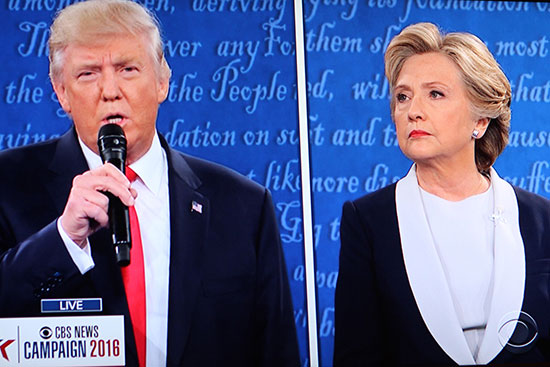Trump v. Clinton Subject of Tonight’s Gitner Lecture
CAS profs analyze the familiar, and unprecedented, in 2016

Donald Trump and Hillary Clinton rode long-standing political trends to their parties’ nominations, a topic to be probed during tonight’s annual Gitner Lecture panel discussion, Trump v. Clinton: How Does 2016 Compare? Photo by Flickr contributor Bill B
In less than three weeks, Americans will choose a president from the most unpopular candidates in decades: one condemned for secrecy and self-serving establishment ties, the other a political neophyte who has driven off some of his own party’s leaders with boasts of predatory behavior and statements condemned as xenophobic, antiwoman, or just false. How did we get to this point?
Actually, both Hillary Clinton and Donald Trump rode long-unfolding political developments to this year’s showdown, visible to anyone who looked, says Bruce Schulman, although carried this year to a “reductio ad absurdum.”
The rise of both candidates caps a half century of changes in our presidential selection process that Schulman—BU’s William E. Huntington Professor of History—will outline tonight during a panel presentation on the 2016 race. Joining Schulman to discuss Trump v. Clinton: How Does 2016 Compare? are Neta Crawford, a College of Arts & Sciences professor of political science, and Katherine Levine Einstein, a CAS assistant professor of political science.
The event is the third annual Gerald and Deanne Gitner Family College of Arts & Sciences Lecture. The series spotlights CAS faculty whose research and teaching are on topics of broad interest to the public and the BU community.
Among the changes enabling Trump’s rise, Schulman says, was the spread of presidential primaries in the early 1970s. “In 1976, Jimmy Carter would perfect the modern outsider campaign strategy,” he says. Shifting nomination choices into the voters’ hands through primaries “enabled Trump to become the GOP nominee despite the opposition of the party leadership.”
And reality-show star Trump’s ascent comes almost half a century after the 1968 “celebrity campaign,” as Schulman calls it, of Richard Nixon, who appeared that year on the TV hit Rowan and Martin’s Laugh-In. Among the Nixon staffers urging him to do the show was Roger Ailes, who prepped Trump for his TV debates with Clinton, despite resigning the chairmanship of Fox News this summer amid sexual harassment charges.
On the Democratic side, Clinton triumphed by appealing to “an enduring Democratic majority” she became familiar with while working on George McGovern’s doomed 1972 campaign, says Schulman: “the combination of nonwhite voters with what we might now call the high-tech constituency—college-educated, middle-class professionals.…Today’s Democratic Party, both its leadership (think Clinton) and its grassroots constituency (think Sanders), bear the imprint” of McGovern’s bid.
Crawford, a scholar of international relations theory and foreign policy, says her remarks will put the American election in global perspective. Einstein, who specializes in domestic policy and racial and ethnic politics, may take a different tack than Schulman by focusing on what is different about this election from past ones. She says she’s struck by how “the white vote is cleaved along educational lines in ways that we haven’t seen in decades.…Trump’s support among noncollege white voters exceeds that of college-educated white voters by a striking 20-percentage point difference. Those are levels that we haven’t seen since 1980.”
The Donald differs from past candidates in another respect, Einstein says: his fondness for conspiracy theories about the government—“that the Bureau of Labor Statistic invents statistics about the unemployment rate, that Obama was not born in the United States, that the Clintons may have been involved in Vince Foster’s death.” (Foster, whose 1993 suicide fueled anti-Clinton conspiracy theorists, was a deputy White House counsel under Bill Clinton.)
Trump’s “willingness to spread misinformation/conspiracy could have real long-term consequences for American democracy,” Einstein says. “Misinformation is very difficult to correct, and mere exposure to conspiracy theorists, regardless of beliefs, diminishes trust in a variety of government institutions.”
The third annual Gerald and Deanne Gitner Family College of Arts & Sciences Lecture, Trump v. Clinton: How Does 2016 Compare? is tonight, Thursday, October 20, at 6:30 p.m., at the School of Law Auditorium, 765 Commonwealth Ave.

Comments & Discussion
Boston University moderates comments to facilitate an informed, substantive, civil conversation. Abusive, profane, self-promotional, misleading, incoherent or off-topic comments will be rejected. Moderators are staffed during regular business hours (EST) and can only accept comments written in English. Statistics or facts must include a citation or a link to the citation.